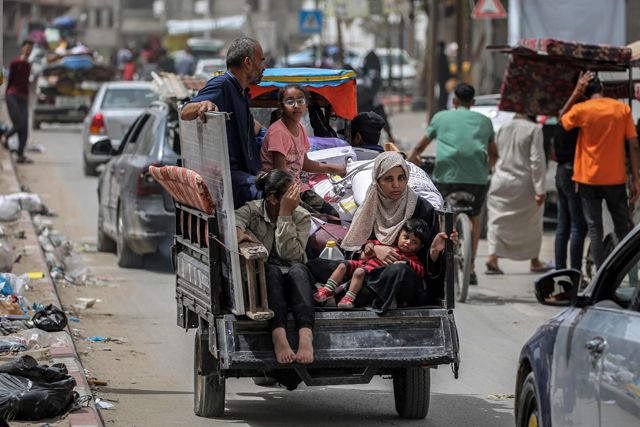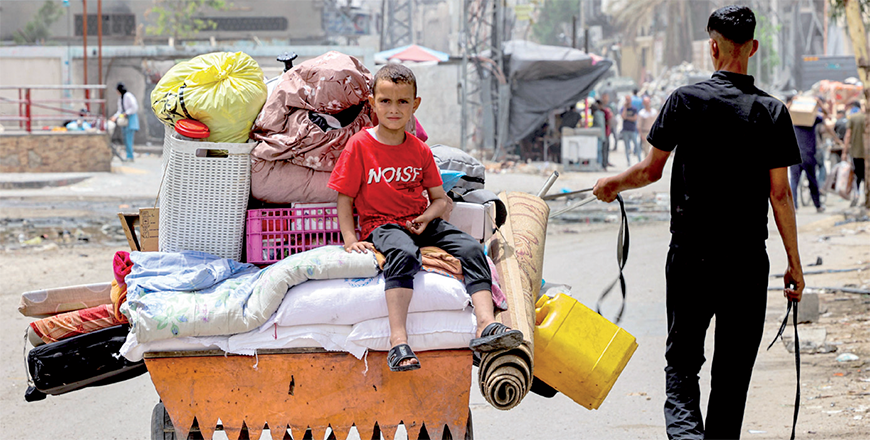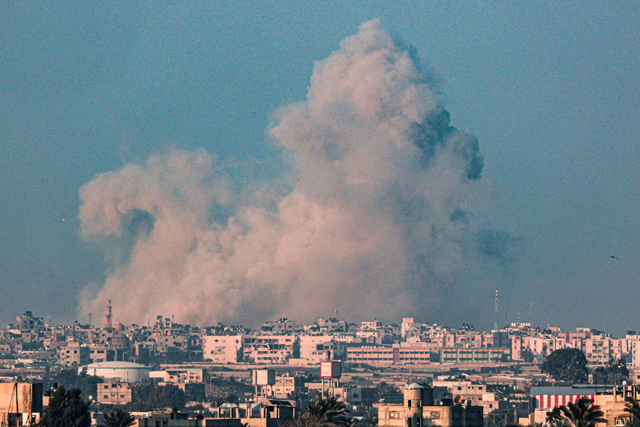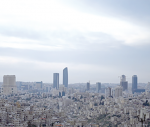You are here
Fierce fighting rocks Gaza after US warning of post-war 'anarchy'
By AFP - May 14,2024 - Last updated at May 14,2024

This photo taken from Israel's southern border with the Gaza Strip shows destroyed buildings in the Palestinian territory on Monday (AFP photo)
GAZA CITY, Palestinian Territories — Israel continued with its attack on Gaza on Monday, including in far-southern Rafah, despite US warnings against a full-scale invasion of the crowded city and of the threat of post-war "anarchy" across the Palestinian territory.
AFP correspondents in Gaza reported helicopter strikes and heavy artillery shelling in the east of Rafah, as well as battles in northern Gaza's Jabalia refugee camp and Gaza City's Zeitun neighbourhood.
Israel last week defied a chorus of warnings, including from top ally Washington, and sent tanks and troops into the east of Rafah, the city on the Egyptian border where some 1.4 million Palestinians had sought shelter.
This has sparked an exodus of nearly 360,000 people from Rafah so far, said the UN agency for Palestinian refugees UNRWA, which warned that "no place is safe" in the largely devastated territory.
US Secretary of State Antony Blinken said on Sunday that Washington had not seen any credible Israeli plan to protect civilians in Rafah, and that “we also haven’t seen a plan for what happens the day after this war in Gaza ends”.
“Israel’s on the trajectory, potentially, to inherit an insurgency with many armed Hamas left or, if it leaves, a vacuum filled by chaos, filled by anarchy and probably refilled by Hamas,” he told NBC.
Fighting has raged in northern Gaza where — months after Israel declared Hamas’s command structure had been dismantled — an Israeli army spokesman said there were “attempts by Hamas to rebuild its military capabilities”.
“The army threw leaflets and sent a message on mobile phones warning everyone to leave Jabalia” refugee camp, said one displaced Palestinian, Umm Adi Nassar, after arriving in Gaza City.
“This is not the first time we have been displaced,” she said. “Every time we try to return and settle, there is an invasion operation, and the army with its airplanes and tanks bombards the houses and kills people.”
Hamas’s armed wing, the Ezzedine Al Qassam Brigades, also said that its fighters were engaged in ground battles in Rafah and Jabalia.
A strike overnight on a house in Rafah killed at least four people, said the city’s Kuwaiti hospital.
Rafah residents on Monday received more evacuation orders through phone calls and text messages, prompting yet more people to leave their homes, witnesses said.
While Israel has vowed to destroy remaining Hamas forces in Rafah, the New York Times cited unnamed US officials as saying that both US and Israeli intelligence suggested the group’s leader Yahya Sinwar was not hiding there.
Sinwar — who has not been seen since the October 7 attack which Israel says he orchestrated — “most likely never left the tunnel network” under southern Gaza’s main city of Khan Yunis, the newspaper said.
Amid the fighting, Egyptian, Qatari and US mediation efforts towards a truce appeared to have stalled.
UN chief Antonio Guterres urged “an immediate humanitarian ceasefire, the unconditional release of all hostages and an immediate surge in humanitarian aid” into Gaza.
Israel’s bombardment and offensive in Gaza have killed at least 35,091 people, mostly women and children, according to the health ministry in the Hamas-run territory.
Israel’s military says 272 soldiers have been killed since the start of the ground offensive in Gaza on October 27.
The war has displaced most Gazans, many multiple times.
UNRWA chief Philippe Lazzarini said on Sunday that Israel’s latest evacuation orders were “forcing people in Rafah to flee anywhere and everywhere”.
Umm Mohammed Al Mughayyir, who has had to move her family seven times to escape the fighting, said: “We have reached a point where we wish for death.”
Residents were told to head to the Al Mawasi “humanitarian zone” on the coast northwest of Rafah, though aid groups have warned it is not ready for an influx of people.
Hisham Adwan, spokesman for the Gaza crossings authority, told AFP on Sunday the Rafah border point with Egypt has remained closed since Israeli troops seized its Palestinian side last Tuesday, “preventing the entry of humanitarian aid”.
The health ministry said on Monday that Gaza’s health system was “hours away” from collapse after fighting has blocked fuel shipments.
Israel’s military said on Sunday it had opened a new border crossing into northern Gaza as “part of the effort to increase aid routes”.
Related Articles
RAFAH, Palestinian Territories — The Israeli military on Saturday ordered Palestinians to leave more areas of eastern Rafah and the northern
RAFAH, Palestinian Territories — Israel struck Gaza on Sunday and troops were battling militants in several areas of the Hamas-run territory
GAZA STRIP, Palestinian Territories — Israel's prime minister said on Sunday a potential ceasefire in its war against Hamas fighters would o


















